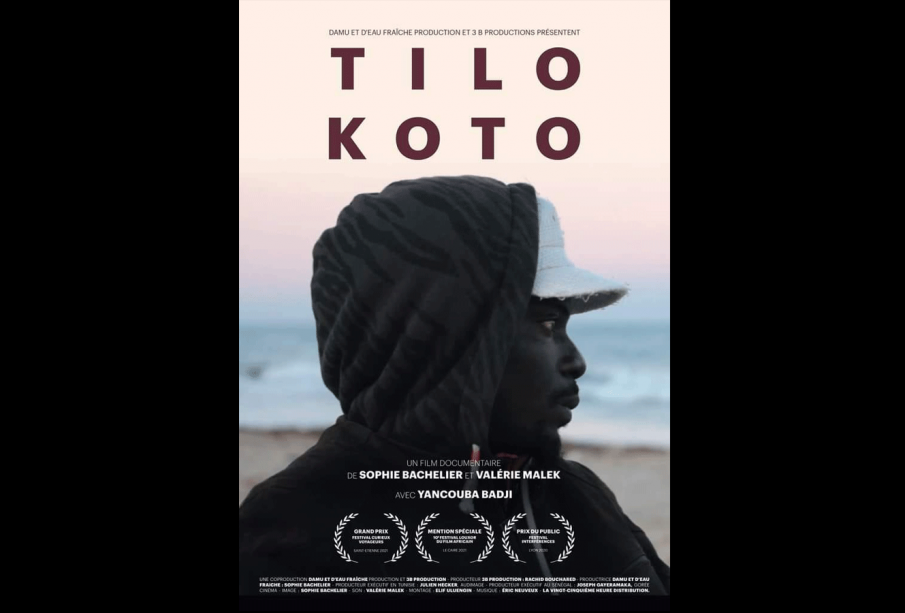TILO KOTO, IMMIGRATION CANCER

Releasing in French cinemas on December 15, 2021, « Tilo koto » is touring in festivals. It was the result of an attempt to capture the words of emigrants in transit in Tunisia and the meeting with one of them, Yancouba Badji, who would prove to be a painter. These few words about the film are followed by the debate carried out on the online TV set of the Apt festival, in the presence of Yancouba Badji and Sophie Bachelier, hosted by Tahar Chikhaoui and Olivier Barlet, where Internet users who had seen the film could ask their questions broadcast by a moderator.
Refrigerator, Yancouba Badji made a decent living between Casamance and Gambia, but, worried by the squadrons of the death of dictator Yahah Diamé, he had to leave. And here he is clandestine on roads and crossings where he nearly lost his life several times. After four attempts on the Libyan coast, he is in transit in Tunisia, stunned by these terrible experiences. To rebuild himself but also to alert, he obtains brushes and thus retraces what he has experienced.
Sophie Bachelier meets the visual artist and director Valérie Malek at the Gabès festival. They agree around a collaborative film project to capture the experience of migration. By carrying out a series of interviews in the reception center where Yancouba Badji is a refugee, they understand that through his experience and his impact on his companions, he focuses a vision to pass on. They decide to focus the film on him.
 ,
The question then arises of articulating this individual destiny with the collective destiny. Yancouba’s paintings facilitate this openness: they seem to say « we » rather than « I ». Added to this is the aesthetic of respect that characterizes the work of Sophie Bachelier: by making the most vulnerable familiar, it appeals to our awareness of our responsibility to facilitate their belonging to humanity.
It goes through the relationship: the testimonies are intimacies about the reasons for leaving the pain. The staging is worked out with the people filmed. This is how the film takes us to the cemetery of the unknown, where those rejected by the sea are buried without discrimination of religion on the initiative of a « just », Chamseddine Marzoug, who wishes to offer them a burial place. Because if Yancouba was lucky, it was not the case for everyone.
Back in Casamance, Yancouba reunites with his mother, who fears losing her son in these deadly migrations, after she has already lost two brothers. The moment, captured with images combining purity and beauty, is very emotional.
Many have worked to document the harshness of migration, to prevent, to act. If « Tilo koto » brings an original stone to this approach, it is that beyond documenting the trauma and thus building a memory of it, thanks to the paintings of Yancouba who himself draws the parallel between his experience and the boats slave traders, it anchors the understanding of exile and wandering. A sensitive and striking film to be distributed widely.
Refrigerator, Yancouba Badji made a decent living between Casamance and Gambia, but, worried by the squadrons of the death of dictator Yahah Diamé, he had to leave. And here he is clandestine on roads and crossings where he nearly lost his life several times. After four attempts on the Libyan coast, he is in transit in Tunisia, stunned by these terrible experiences. To rebuild himself but also to alert, he obtains brushes and thus retraces what he has experienced.
Sophie Bachelier meets the visual artist and director Valérie Malek at the Gabès festival. They agree around a collaborative film project to capture the experience of migration. By carrying out a series of interviews in the reception center where Yancouba Badji is a refugee, they understand that through his experience and his impact on his companions, he focuses a vision to pass on. They decide to focus the film on him.
 ,
The question then arises of articulating this individual destiny with the collective destiny. Yancouba’s paintings facilitate this openness: they seem to say « we » rather than « I ». Added to this is the aesthetic of respect that characterizes the work of Sophie Bachelier: by making the most vulnerable familiar, it appeals to our awareness of our responsibility to facilitate their belonging to humanity.
It goes through the relationship: the testimonies are intimacies about the reasons for leaving the pain. The staging is worked out with the people filmed. This is how the film takes us to the cemetery of the unknown, where those rejected by the sea are buried without discrimination of religion on the initiative of a « just », Chamseddine Marzoug, who wishes to offer them a burial place. Because if Yancouba was lucky, it was not the case for everyone.
Back in Casamance, Yancouba reunites with his mother, who fears losing her son in these deadly migrations, after she has already lost two brothers. The moment, captured with images combining purity and beauty, is very emotional.
Many have worked to document the harshness of migration, to prevent, to act. If « Tilo koto » brings an original stone to this approach, it is that beyond documenting the trauma and thus building a memory of it, thanks to the paintings of Yancouba who himself draws the parallel between his experience and the boats slave traders, it anchors the understanding of exile and wandering. A sensitive and striking film to be distributed widely.











